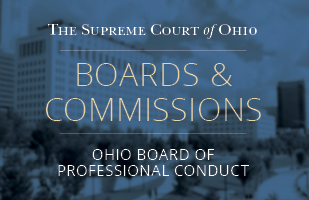Conduct Board: Preserving Judicial Integrity

The conduct board’s centralized governance of ethical behavior by Ohio's attorneys began in 1957 when the Supreme Court assumed all aspects of attorney discipline.

The conduct board’s centralized governance of ethical behavior by Ohio's attorneys began in 1957 when the Supreme Court assumed all aspects of attorney discipline.
Editor’s Note: This story is the first in a series on the boards and commissions of the Supreme Court of Ohio.
Judges and attorneys take an oath to maintain the integrity of Ohio’s justice system, and the profession maintains a disciplinary system to address oath violations.
The system is founded on the belief that lawyers and judges can fairly and impartially investigate complaints and, when necessary, carry out discipline for the lawyers of Ohio. This system heightens the public’s confidence in the legal profession.
The key element of this system – disciplinary proceedings – are the province of the Ohio Board of Professional Conduct.
Established in 1957 as the Board of Commissioners on Grievances and Discipline and renamed in 2014, the Board of Professional Conduct serves as the second stage in a three-tier system that investigates, tries, and rules on allegations of ethical violations by Ohio lawyers and judges.
Richard Dove, the director since 2011, points out that the conduct board’s existence is part of “the Ohio Supreme Court’s responsibility for regulating the practice of law under the state constitution.”
The conduct board operates independently of the Court, granting its staff and board members autonomy over the investigation of individual cases and whether a panel should be convened to pursue an alleged offense by a judge or lawyer.
“The primary purpose of the disciplinary system is to protect the public, and sanctions are recommended and imposed with that principle in mind,” Dove said.
“Our board operations are conducted independently of the Court. In the end, we can only make recommendations. The justices of the Court have the final say.”
The process begins with the filing of a grievance with either a certified grievance committee – such as the state or local bar association – or with the Office of Disciplinary Counsel.
Complaints are investigated – confidentially – at this first step to see if they meet criteria regarding the severity of the claims and whether there’s evidence to substantiate them. If so, the next step is a transfer of the matter to the Board of Professional Conduct.
To get a sense of the scale, of the approximately 3,000 grievances filed with the disciplinary authorities in 2020, 71 formal complaints were presented to the Board of Professional Conduct for misconduct at a level of seriousness that can be proven.
When a case reaches the conduct board, it’s assigned to a three-member panel that will hear evidence and arguments from the lawyer or judge accused of misconduct – known as the “respondent.” The party claiming wrongdoing – the “relator” – typically is either the disciplinary counsel or a bar association.
The evidence to support a misconduct finding must be clear and convincing and greater than the threshold in most civil law proceedings because an attorney or judge could potentially lose their law license.
After a hearing, the panelists write a report with their findings and recommendation, which goes to the conduct board for review. The conduct board can agree with the panel’s recommendation or amend it, and send along its decision to the Supreme Court.
The Court agrees with the board’s recommended sanction roughly 85% of the time, Dove said.
Punishments can vary from a public reprimand, a license suspension for a certain time, or permanent disbarment from the practice of law in Ohio. The panels and the board also handle reinstatement hearings for suspended attorneys.
The panelists are among 28 board commissioners who each serve three-year terms – 17 lawyers, seven judges, and four non-attorneys. Commissioners are appointed by the Supreme Court, and come from each of Ohio’s 12 appellate districts.
Along with the work required to facilitate hearings – including preparation, participation, and writing reports – board members also have other administrative responsibilities. These includes service on one of four board committees that conduct probable cause reviews, recommend advisory opinions, oversee the board’s budget and personnel, and review and recommend rule amendments.
“Board service is a time-consuming commitment for commissioners,” Dove said. “When you add it all up, a commissioner will spend about 30 days a year on board-related responsibilities, with most devoting time on a weekly basis.”
To create a greater understanding of ethical expectations of lawyers, judges, and judicial candidates, the board also educates attorneys through presentations and outreach activities. These can include continuing legal education sessions, or events with bar associations, judicial associations, and law schools.
Clarification on ethical issues for the legal community also occurs in one-on-one communication as the board will respond to approximately 2,000 phone calls and emails annually from judges, lawyers, and clients seeking guidance about compliance with professional obligations.
The conduct board’s centralized governance is an evolution that took place over decades.
Originally, much of the responsibility for attorney and judicial discipline was handled locally by judges and bar associations. In 1957, the Supreme Court assumed authority for all aspects of attorney discipline and created the board to assist it in this process.
“A centralized process for the review of professional misconduct allegations and the imposition of discipline ensures fair and consistent application of the standards of conduct adopted by the Supreme Court,” Dove said.
Service on the Board is one of the many ways an attorney or judge can give back to the profession. The Board of Professional Conduct, like other boards and commissions, has a need for volunteers to share in maintaining the integrity of the profession. The Board of Professional Conduct self-regulates the profession and its nearly 50,000 Ohio lawyers. The justices of The Supreme Court appoint the members of the Board and are always grateful for applications from those willing to serve.

